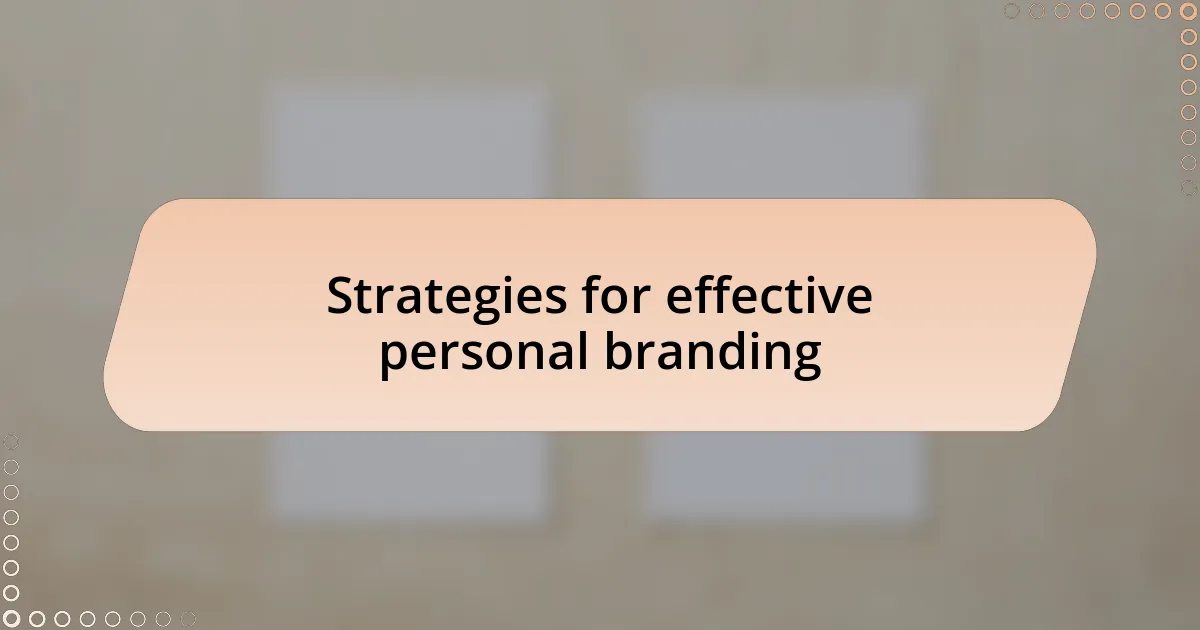Key takeaways:
- Personal branding is about authenticity and creating a narrative that resonates with others, emphasizing trust and relationships.
- Corporate branding focuses on defining a company’s identity and differentiating it in the marketplace, fostering emotional connections with consumers.
- Effective branding goes beyond logos; it builds trust, loyalty, and allows businesses to command premium prices by creating a strong identity.
- Strategies for branding include ensuring authenticity, maintaining consistency across platforms, and engaging actively with audiences to foster connections.
Author: Evelyn Harper
Bio: Evelyn Harper is an award-winning author known for her captivating novels that explore the complexities of human relationships and the beauty of everyday life. With a background in psychology and a passion for storytelling, she weaves intricate narratives that resonate with readers around the globe. Evelyn’s work has been featured in numerous literary magazines, and her debut novel was listed as a bestseller. When she’s not writing, she enjoys hiking in the mountains of her home state, Oregon, where she draws inspiration from nature and the world around her.
Understanding personal branding

Personal branding is about defining who you are and what you stand for. I remember when I first faced the challenge of establishing my own brand; it felt daunting to distill my passions and expertise into a cohesive identity. Reflecting on that journey, I realized that authenticity plays a crucial role—how can you connect with others if you’re not being true to yourself?
As I’ve delved deeper into personal branding, I’ve come to see it as a narrative we create around our professional life. It’s fascinating how our unique stories can resonate with others. Isn’t it empowering to think that your individual experiences can inspire someone else’s journey? Sharing those moments of triumph or struggle can transform your brand into something relatable and impactful.
Ultimately, personal branding isn’t just about self-promotion; it’s about building trust and relationships. I recall a time when my openness about mistakes attracted new clients who appreciated my transparent approach. How do you want people to perceive you? This question is at the heart of personal branding, encouraging us to be deliberate in shaping our public persona.
Understanding corporate branding

Corporate branding encapsulates the essence of an organization’s identity, from its mission to its core values. I was once part of a team that dramatically redefined our company’s visual identity, and it struck me how critical it is for a brand to communicate a cohesive message. Isn’t it interesting how a logo or tagline can evoke trust and familiarity among customers?
At its heart, corporate branding is about positioning a company in the marketplace and differentiating it from competitors. I remember studying successful brands like Apple and Nike; their ability to create emotional connections with their audience is nothing short of fascinating. How do these corporations consistently engage consumers? Their branding strategies focus not just on selling products, but on embedding an ethos within their brand image.
Moreover, corporate branding influences stakeholder perception, impacting everything from employee morale to customer loyalty. I noticed firsthand how a strong corporate brand can galvanize team spirit; when everyone believes in what the brand stands for, it cultivates a sense of pride. Why do you think some companies inspire deep loyalty? The answer often lies in a well-defined corporate brand that resonates with both employees and customers alike.
Importance of branding in marketing

Branding is a powerful tool in marketing that goes beyond just a name or logo; it’s about creating an identity that resonates with your target audience. I recall a time when I consulted with a startup that struggled to find its voice. Through branding, we crafted a unique narrative that not only attracted customers but fostered genuine community engagement. Can you believe the impact that a compelling story can have?
Additionally, effective branding instills a sense of trust and loyalty among consumers. I remember when I switched to a particular skincare brand just because their consistent messaging made me feel safer about the products I was using. It’s intriguing how consumers often overlook the details of a product if they feel connected to the brand behind it. Would you choose a trusted brand over an unknown one? Most likely, your answer is yes, and that’s the essence of branding in building confidence.
Finally, well-executed branding empowers businesses to command premium prices. Through my experience, I’ve noticed that brands with strong identities—like Patagonia, for instance—can charge more because consumers perceive added value. This correlation raises a vital question: how does a brand’s image change your willingness to spend? In a competitive landscape, the answer often lies in the strength of the brand itself.
Strategies for effective personal branding

Building a powerful personal brand starts with authenticity. From my own journey, I’ve learned that sharing genuine experiences can create strong connections. When I began speaking at industry events, I found that opening up about my failures made my successes resonate more deeply with the audience. Have you ever noticed how vulnerability often invites more trust?
Another effective strategy is consistency across your platforms. Whether I’m posting on LinkedIn or sharing insights in a blog, I ensure my voice remains recognizable. I once encountered a professional whose online presence was fragmented—his message varied from platform to platform, confusing potential clients. It made me think: how can we expect others to understand our brand if we don’t present it cohesively?
Lastly, engaging actively with your audience can significantly enhance your personal brand. I’ve seen great results when I take the time to respond to comments and messages. It’s like nurturing a garden; the more effort you put in, the more your connections flourish. So, how can you transform passive followers into active supporters? By treating them as valued participants in your narrative.
Strategies for effective corporate branding

Building an effective corporate brand often hinges on establishing a clear mission and vision. I remember when one organization I consulted for struggled with defining its core values. After several brainstorming sessions, they finally zeroed in on a commitment to sustainability—a defining element that not only unified their messaging but also attracted like-minded clients. Isn’t it fascinating how a strong mission can serve as a north star for all branding efforts?
Another critical strategy is designing a cohesive visual identity. I once worked with a tech startup whose logo and color scheme seemed almost random, lacking alignment with their innovative spirit. Once we revamped their branding to reflect a modern aesthetic, it was like a light bulb turned on; their new image resonated with clients and reinforced their position in the industry. How can you ensure that your visual elements are not just pretty but also purposeful?
Finally, storytelling can transform corporate branding from bland to brilliant. I’ve seen brands that weave their history and values into marketing materials create powerful emotional connections. One client shared a story about how their products were born from a personal challenge, which brought authenticity and relatability to their brand. What stories does your company have that could deepen connection with your audience? By sharing your journey, you invite others to become part of it.